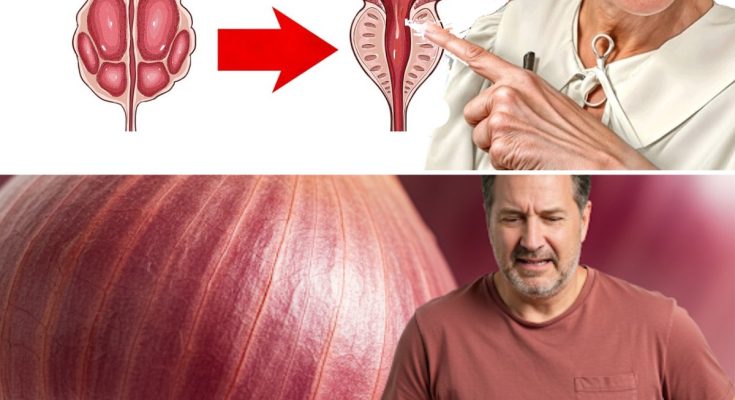These may be signs of a tired prostate, a concern especially common after 50.
But what if part of the answer has been quietly waiting in your kitchen this whole time?
Surprisingly, the papery outer peel of an onion — something most of us throw away — contains plant-based compounds that may gently support urinary comfort and prostate wellness.
Let’s take a closer look at what makes this forgotten ingredient so special.
🌿 What’s Hiding in Onion Peels?
Onion peels are rich in quercetin, a powerful plant antioxidant found in fruits and vegetables. But in onion skins, quercetin is even more concentrated.
💡 Research suggests that quercetin may:
-
Support healthy inflammation responses
-
Provide antioxidant protection for cells, including prostate tissue
-
Help relax smooth muscles in the urinary tract, which may improve flow
While onion peel tea isn’t a cure or replacement for medical care, it may offer a gentle, food-based form of support you can explore from the comfort of your home.
🍵 How to Make Onion Peel Tea at Home
Making this soothing tea is incredibly easy — and costs almost nothing.
🌰 You’ll Need:
-
The dry outer peels from 1–2 organic onions
-
2–3 cups of filtered water
-
Optional: a slice of lemon or a teaspoon of honey for taste
🧑🍳 Instructions:
-
Rinse the onion peels gently.
-
Bring 2–3 cups of water to a boil.
-
Add the peels and let simmer for 10 minutes.
-
Turn off the heat and steep another 10 minutes.
-
Strain and sip warm or chilled.
🕒 Drink 1 cup per day, preferably in the evening or after meals. Start small and see how your body responds.
🧠 More Reasons to Keep Those Onion Peels
On top of supporting the prostate, onion peel tea may:
-
Offer antioxidants that protect your cells
-
Help balance blood pressure
-
Support digestion thanks to trace amounts of fiber
It’s a gentle practice that fits easily into your evening routine.
✅ Other Natural Ways to Support Prostate Wellness
If you’re looking to take a well-rounded approach, here are some additional lifestyle tips that work well alongside onion peel tea:
🍅 1. Eat Lycopene-Rich Foods
Found in tomatoes, watermelon, and pink grapefruit — lycopene may support prostate tissue health.
🥜 2. Include Zinc-Rich Foods
Zinc plays a role in prostate function. Try adding pumpkin seeds, chickpeas, or cashews to your meals.
🚶♂️ 3. Move More, Sit Less
Gentle activities like walking, swimming, or even pelvic floor exercises (yes, Kegels for men!) can support circulation and urinary flow.
☕ 4. Limit Evening Stimulants
Caffeine and alcohol may irritate the bladder. Swap your evening drink with calming teas or cucumber-infused water.
🥗 5. Focus on Anti-Inflammatory Foods
A diet rich in colorful fruits, veggies, omega-3s, and whole grains supports your body’s natural balance.
⚠️ A Quick Word of Caution
Onion peel tea is generally safe for most people. However, check with your healthcare provider first if:
-
You’re taking blood thinners or anti-inflammatory medications
-
You have a known allergy to onions
-
You’re managing a chronic condition and taking multiple medications
Always use organic onions when possible, and rinse the peels well before brewing.
🌟 Final Thoughts: A Small Step Toward Men’s Wellness
Prostate concerns can feel overwhelming — but sometimes, the simplest changes lead to the greatest comfort.
By sipping a warm cup of onion peel tea and making small, consistent choices like eating well and moving more, you’re giving your body gentle support that may pay off in the long run.
Want to give it a try? Let us know in the comments — or tag a friend who’s interested in natural wellness. 🌿
💬 This post is for informational purposes only and is not a substitute for medical advice. Always consult your healthcare provider before starting new health routines or herbal remedies.



